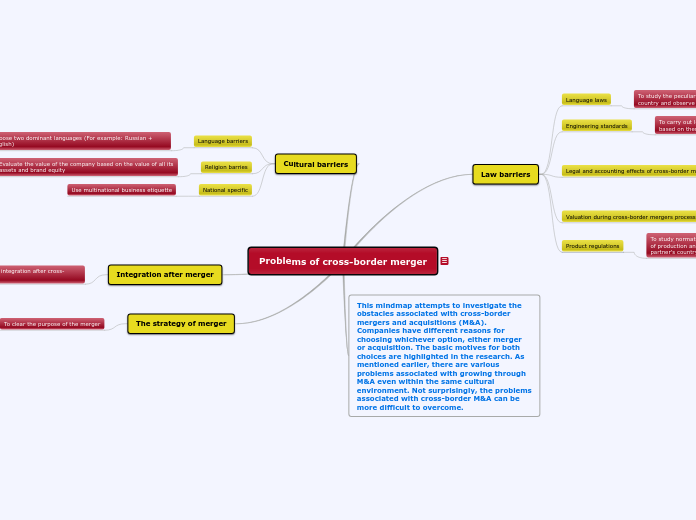Problems of cross-border merger
Law barriers
Language laws
To study the peculiarities of the language law in the partner's country and observe them
Engineering standards
To carry out local engineering standards and produce goods based on them
Legal and accounting effects of cross-border mergers
During the merger process it is necessary to distinguish two
important dates. The Directive’s and all Member States laws
have to differentiate the validity of cross-border mergers
according to accounting and legal view. The date of legal
validity of cross-border merger is governed by the law of the
State where the successor company is established. For effective merger of two companies it's nessesary to choose qualified lawyer that will face with all problems of companies.
Valuation during cross-border mergers process
Evaluate the value of the company based on the value of all its assets and brand equity
Product regulations
To study normative acts concerning regulation of the process of production and sale of products in the territory of the partner's country and to observe them
This mindmap attempts to investigate the obstacles associated with cross-border mergers and acquisitions (M&A). Companies have different reasons for choosing whichever option, either merger or acquisition. The basic motives for both choices are highlighted in the research. As mentioned earlier, there are various problems associated with growing through M&A even within the same cultural environment. Not surprisingly, the problems associated with cross-border M&A can be more difficult to overcome.
Cultural barriers
Language barriers
Choose two dominant languages (For example: Russian + English)
Religion barries
Evaluate the value of the company based on the value of all its assets and brand equity
National specific
Use multinational business etiquette
Integration after merger
To attach great importance to the integration after cross-border merger
The strategy of merger
To clear the purpose of the merger
